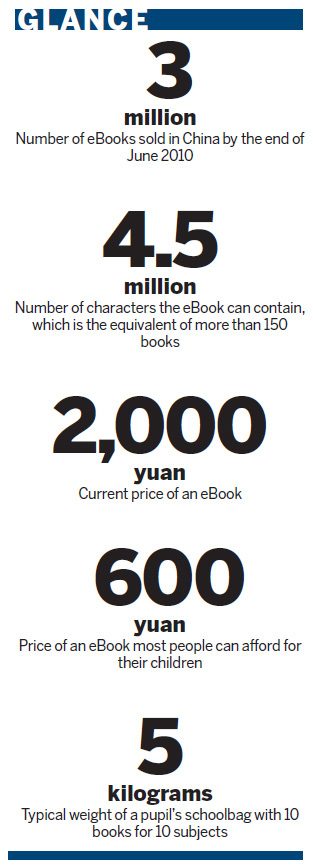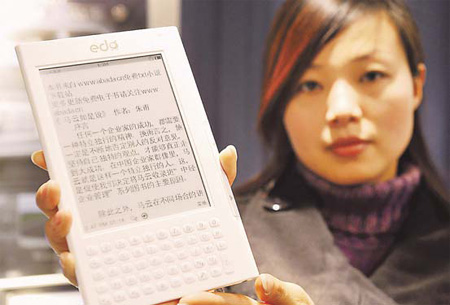eBooks still some way away from students
Obstacles remain
Obstacles include immature and expensive technology and user resistance, according to Zhen.
"I believe the textbook will be one of the last publications impacted by digital innovation. The large scale replacements won't trigger until most people accept and use electronic reading devices."
|
|
|
A staff member of Yangzhou EDO Technologies shows the company's latest product - a seven-mm thick eBook, which is believed to be the third generation of its kind. [China Daily] |
But Zhen also believes the transformation from physical books to digital books is the trend in the long run. He said the Foreign Language Teaching and Researching Press has been talking with eBook manufacturers about cooperating, but they have not yet reached an agreement.
"The eBook market is still developing," he said. "It is premature to take any actions now."
Although the process of replacing paper books might be slow and difficult, it's still worth a try, Yuan said. Some 230,000 pupils in Yangzhou will use more than 2.55 million textbooks each year. "How much wood will be consumed?" he said.
The headmaster also advocates recycling old textbooks. At Sanyuanqiao Elementary School, public textbooks are used in music and arts classes.
"Digital books and public books are not only environmental friendly, but also reduce the weight of school bags," Yuan said.
A pupil's schoolbag with 10 books for 10 subjects, plus notebooks and exercise books, is usually heavier than five kilograms, according to Yuan. Twelve-year-old student Wang Yuwei has to use a mountain bag to bring all the books she needs to go to school.
"I am asking my parents to buy me a trolley," said the skinny little girl.
The faculty hope the eBook, which can contain the equivalent of more than 150 books, or 4.5 million characters, would help the students get rid of their big bundles. But to take notes, the student still has to bring the physical books to school. Only one textbook in the reading course is replaced by the digital reader.

"The electronic book might save money in the long run," said Zhao Meilan, a 37-year-old mother whose daughter is using the donated eBook. She said every year she spends more than 300 yuan to buy her daughter books, including exercise books and reading materials.
"If the device is cheaper than 600 yuan and could be used for more than five years, it would be acceptable for me," said the mother, whose annual income is 20,000 to 30,000 yuan.
Zhao's daughter, 12-year-old Gao Chenxuan, said she always looks forward to using the electronic book in class.
"It's new, and more interesting than the physical books," said the girl. "It's also very easy to operate. It only took me half an hour to learn how to use it."
Tang, Gao's classmate, said he has been playing with a computer since the age of 6, and became a big fan of Warcraft, a famous computer game. The eBook is like another digital toy for the young computer literate.
"I was first excited to use the digital reader, but after a few months, I found it was as boring as the physical books," the boy said with a laugh. "My head aches when I read the text and math formulas, no matter if they are printed on paper or on screen."
"The younger generation is more accepting of new ideas and technologies, and I believe the digital reading will go mainstream," said Tian Tongsheng, an expert from the China Educational Technology Association. Besides Yangzhou, schools in Shanghai and Yiwu in Zhejiang province are also planning to promote digital reading.
"As the technology develops, the function of the eBook will be more and more powerful," Tian said. "But the most important function is to help teaching and studying. If the device could solve some of the education problems bothering teachers and students, it could be a real asset in the classroom."
 0
0 







